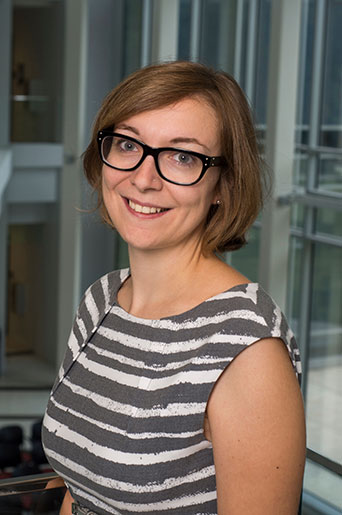Working to be Stewards of the Earth
As a part of the White House's "Grand Challenge" initiative, the College of Engineering and Computing is among U.S. engineering schools focusing on complex yet critical goals such as making solar energy cost-competitive with coal. Researchers also specialize in sustainable energy systems, and environmental and water resources problems.
Quantifying Resilience of Critical Infrastructure
Healthcare systems, school districts, university campuses, government buildings, residential buildings, and business districts are comprised of interdependent buildings that together serve a community function. They rely upon a network of critical lifelines, including water, power, cyber, transportation, and wastewater. A $2.5M National Science Foundation grant (nearly $1.1 million moved to Mason) is aimed at determining how these critical infrastructure-based societal systems (CISSs) withstand and recover from disasters. What the researchers learn from developed complex analysis and modeling techniques will help improve, build, and maintain resilient communities.
Elise Miller-Hooks, the Bill and Eleanor Hazel Endowed Chair in Infrastructure Engineering who joined Mason last year, is the Principal Investigator. Her team is looking specifically at how disasters would impact a healthcare system. What makes this project different from other disaster resilience work, beyond its focus on CISSs, is that it looks at multiple hazard types and incorporates public policy, organizational policy, emergent organizational behaviors and risk communication into a broader quantitative assessment. Areas of study include: how organizational behaviors emerge and evolve as a disaster unfolds and how cyber systems become more vulnerable to follow-on attacks and how to prevent them.
Miller-Hooks brought the collaborative project with her from the University of Maryland. Miller-Hooks worked with PI Judy Mitrani-Reiser at Johns Hopkins who has since moved to NIST. The grant also includes education and outreach aimed at strengthening the pipelines of women in STEM fields. The grant wraps up in August 2018.
Researcher Profile: Viviana Maggioni, Remote Sensing Techniques
Viviana Maggioni’s research interests lie at the intersection of hydrometeorology and remote sensing. In particular, she is interested in the application of remote sensing techniques to estimate and monitor hydrological variables.
Maggioni studies how to improve those retrieval techniques and enhance estimates of their associated uncertainties.
This work has direct applications in water resources management, weather, and climate prediction, as well as agriculture and irrigation practices.
Maggioni is also a Visiting Research Associate at the Earth System Science Interdisciplinary Center at the University of Maryland, which was initiated under a cooperative agreement with the Earth Sciences Directorate at the National Aeronautics and Space Administration’s Goddard Space Flight Center.
She teaches such classes as Coastal Flood Hazards and Stochastic Hydrology.
Departments Active in Sustainable Infrastructure Research
The Sid and Reva Dewberry Department for Civil, Environmental, and Infrastructure Engineering
CEIE attracts and educates Virginia’s best performing students as well as national and international undergraduate and graduate students. Our students are opportunity seekers who are prepared to develop and implement innovative and successful solutions to today’s complex and multi-disciplinary engineering challenges.
Electrical and Computer Engineering
Researchers in the Electrical and Computer Engineering Department work on the foundations on which computer engineering and computer science rest. Electrical engineers design and build the equipment that most of us take for granted—computers, cell phones, televisions, rockets, satellites, communications and computer networks, mobile radios, environmental control systems, robots, weapons, and medical devices. With a proud history as one of the school’s founding departments, ECE also the distinction of being closely allied with the recently established Department of Bioengineering.

